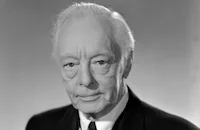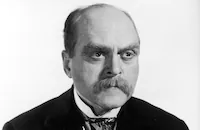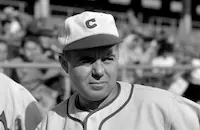The Amazing Mrs. Holliday
Cast & Crew
Bruce Manning
Deanna Durbin
Edmond O'brien
Barry Fitzgerald
Arthur Treacher
Harry Davenport
Film Details
Technical Specs

Synopsis
Young schoolteacher Ruth Kirke is transporting a group of war orphans from South China to San Francisco when their cargo ship is torpedoed and sunk in the mid-Pacific. Along with sailor Timothy Blake, they are the only known survivors of the enemy attack. Upon arriving in San Francisco, Ruth is told by immigration officials that the undocumented children will be held unless someone posts a $500 bond for each child, guaranteeing that they will "not become public charges." Ruth and Timothy go to the home of Commodore Thomas Holliday, the wealthy owner of their sunken ship, to ask for his family's help. When they refuse, Timothy states that Ruth and the commodore were married aboard ship. For the good of the children, Ruth goes along with the deception, and she, Timothy and the war orphans move into the Holliday estate. They are later joined by the commodore's grandson, Thomas Spencer Holliday III. Ruth tells Tom how her father's mission was destroyed in a Japanese bombing raid, and she was sent south on the Burma Road with the European children. Along the way, they found a dying Chinese woman, and Ruth agreed to take care of her child as well. After Ruth learns that she is to inherit the commodore's vast shipping fortune, she and the children try to sneak out of the mansion in the middle of the night, but they are caught by Tom. She then confesses all, telling Tom that she smuggled the children aboard the commodore's ship, thinking that it was going to Calcutta. Once at sea, the commodore then promised to help her get the children into the United States, even if it meant adopting them. After their ship was torpedoed, Ruth and Timothy put the children into a lifeboat, but once they were away from the sinking ship, they discovered that one child, Pepe, had been left behind. The angry Tom insists that Ruth stay and continue the charade until the publicity about her "marriage" dies down, but agrees to care for the orphans at the Holliday estate once she leaves. Later, the children's immigration papers arrive, and Ruth, as promised, prepares to leave for her hometown of Philadelphia, despite the fact that she has fallen in love with Tom. As she waits for her train, Timothy tells Tom that Ruth is engaged to the man sitting next to her. The two are then forced to leave the train station when the innocent man, Jeff Adams, accuses them of a marriage "shake down." Later, a China relief ball is held at the Holliday estate, at which Ruth and Tom finally admit their true feelings for each other. The commodore and Pepe are also at the ball, having been rescued themselves, and knowing of the children's plight, the commodore continues the ruse. He then tells Ruth that he plans to marry her for real and raise the orphans as his own children. The commodore's plans are dashed when his brother Edgar, his sister Louise and his sister-in-law Karen tell him about the romance between Ruth and Tom. The commodore then announces that he and Ruth were never really married, but she is about to become Mrs. Holliday, as she and Tom are to be married in the Holliday estate in a few days.

Cast

Deanna Durbin

Edmond O'brien

Barry Fitzgerald

Arthur Treacher

Harry Davenport

Grant Mitchell

Frieda Inescort

Elisabeth Risdon

Jonathan Hale
Esther Dale
Gus Schilling
J. Frank Hamilton
Christopher Severn
Yvonne Severn
Vido Rich
Mila Rich
Teddy Infuhr
Linda Bieber
Diane Dubois
Billy Ward
[michael Chan]
Douglas Wood
Philip Ahn
Roland Got
Iris Wong
Bo Ching
Eleanor Soo Hoo
Paul Fung

Irving Bacon

Joseph Crehan
Robert Homans
Charles Trowbridge
Wade Boteler

Richard Loo
Eddie Dunn
Tom Dugan
Harold Minjir
Dorothy Vaughan
Dorothy Granger

Ray Walker
George Chandler
Joseph King
Chester Gan
Richard Davies
Jack Mulhall
Eddie Coke
Pat Gleason
Charles Sherlock

Bess Flowers
Bobby Barber
George Guhl
Olaf Hytten
Gene O'donnell
Leslie Denison
Bruce Wong
Polly Bailey
Shirley Lew
Eddie Burns
Vangie Beilby
Crew
Woody Bredell
Bernard B. Brown
Madame Rosalyda Chang
Madame Rosalyda Chang
R. A. Gausman
Giuseppe Giacosa
Tom Gubbins
William Hedgcock
Luigi Illica
Boris Ingster
John Jacoby
Ted Kent
Fritz Kreisler
Sonya Levien
Bruce Manning
Bruce Manning
Alice Mattullath
Joseph Mcdonough
Ethelbert Nevin
Martin Obzina
T. F. Offenbecker
Jack Otterson
Charles Previn
Giacomo Puccini
Frank Ryan
H. J. Salter
Andres De Segurola
Frank Shaw
Frank Skinner
Frank Stanton
Leo Townsend
Vera West

Film Details
Technical Specs

Award Nominations
Best Music, Original or Comedy Series
Quotes
Trivia
Notes
The working titles of this film were The Divine Young Lady, Call Me Yours and Forever Yours. The onscreen end credits do not list child actor Michael Chan, but only his character name, "The Chinese Baby."
In July 1941, Universal announced that actress Deanna Durbin's next film would be They Live Alone, based on an original screenplay by Sonya Levien and directed by William A. Seiter. Later that month, Hollywood Reporter stated that They Live Alone would begin production on September 15, 1941; however, on October 13, 1941, Hollywood Reporter announced that Durbin had refused to attend a press conference announcing the production of the film, and was, in fact, meeting in New York City with Universal president Nate Blumberg to demand more control over her films. On October 17, 1941, Durbin was suspended by the studio for her refusal to appear in They Live Alone. Hollywood Reporter later stated that Durbin was continuing her suspension indefinitely, as she wanted permission to work for studios other than Universal, specifically M-G-M, where the producer of her previous Universal films, Joe Pasternak, had moved. In December 1941, Hollywood Reporter speculated that Durbin's suspension had cost Universal over $200,000, as both They Live Alone and Marriage of Inconvenience, a second project designated for director Seiter, had been canceled due to their failure to find an appropriate female lead. Finally, on January 30, 1942, Durbin and Universal settled their dispute, and the actress was given story and director approval on all her films. Hollywood Reporter announced on February 3, 1941 that They Live Alone was once again being put back into the production schedule at Universal, with Durbin in the lead role. On March 18, 1942, however, Universal announced that Three Smart Girls Join Up, a second follow-up to Durbin's debut film, Three Smart Girls (see AFI Catalog of Feature Films, 1931-40; F3.4623) and based on a story by RAF pilot Derek Bolton, was replacing They Lived Alone on the Universal production schedule and would begin shooting in May 1942. Hollywood Reporter then stated on April 15, 1942 that all previously announced Durbin films had been replaced on the Universal production schedule by The Divine Young Lady, the initial working title of this film.
In May 1942, the title of the film was changed to Forever Yours and noted French director Jean Renoir, who had signed a one-picture deal with Universal in February 1942, was assigned to the film. Later that month, Hollywood Reporter stated that editor Ted Kent was being assigned to the film, replacing Bernard W. Burton, the editor on Durbin's previous films, who had been promoted to associate producer at Universal. On August 7, 1942, Hollywood Reporter announced that Renoir was being removed from the film after forty-seven days of shooting. According to the trade journal, the French director was fired due to his slow filming pace. Forever Yours had a forty-nine day shooting schedule, and Renoir was reportedly ten weeks behind schedule. Renoir, however, stated that he was leaving the film due to recurring pain caused an old World War I leg injury. Durbin requested that producer Bruce Manning assume the directorial reigns, and it was projected that the film would complete shooting in seven weeks. In early September 1942, after seventeen weeks of filming, writer Robert White was brought in to re-write the film's finale. It has not been determined, however, if any of his work was used in the released film. In September 1942, Universal announced that it was suspending principal photography on the film for at least one week for script revisions and the shooting of shipyards and street scene backgrounds in San Francisco. Hollywood Reporter reported that producer-director Manning was being forced to direct this second unit work in San Francisco himself, as some of the selected sites were considered military backgrounds and would require special clearances. Universal requested SAG permission to pay half-salaries to the players during this lay-off period. Hollywood Reporter then announced that principal photography had resumed on October 19, 1942, after significant re-writing on the screenplay by Manning and Frank M. Ryan.
A Universal plot synopsis based on a working draft of the screenplay suggests that numerous plot changes were made before the final draft was completed. In the earlier draft, Commodore Holliday attempts to run the Japanese blockade of China; Ruth and the children sneak onto the cargo ship without the help or knowledge of Timothy; when the commodore safely returns to San Francisco and his "bride," the heartbroken Tom decides to head back to sea himself; the commodore is told of Tom and Ruth's romance by Timothy, not his relatives; Ruth and Tom are married and the commodore adopts the children; and after his marriage, Tom does go to sea, but when Ruth discovers Pepe missing once again, Tom finds the young stowaway on his ship and a raft is lowered to send Pepe back to the Holliday estate. Universal press materials state that the musical numbers "Carmean," "Kashmiri Song" and "The Recessional March" were recorded by Deanna Durbin for this film, but they were not heard in the viewed print. For "The Recessional March," Durbin was accompanied by a 285 member male chorus, according to press materials. Technical advisor and lyric translator Madame Rosalyda Chang was a noted Chinese author, lecturer and diplomat at the time of this film's production, and her husband was a former Chinese ambassador to Portugal, Poland and Czechoslovakia.
Hollywood Reporter production charts include Kim Wong in the cast, but her participation in the released film has not been determined. Frank Skinner and H. J. Salter were nominated for an Academy Award for their musical score to this film, but lost to Alfred Newmann's score for The Song of Bernadette. In 1955, Levien's story was presented on television under the same title as part of the Lux Video Theatre, starring Barbara Rush and Grant Williams, and directed by Richard Goode.













